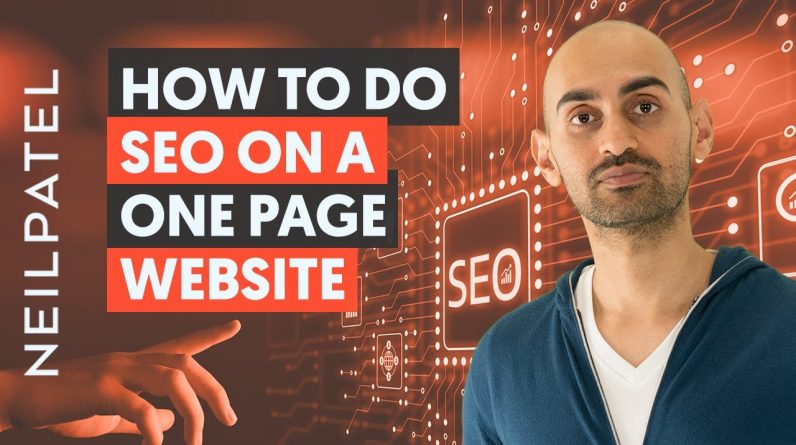
How to do SEO on a One Page Website | Not everyone wants a multi-page website. If you’re a digital marketer, you’ve already worked with a company or consulted with people who just have one-page websites, and in many cases, they refuse to change because they’re like, “What’s wrong with my one-page website? I have everything here that I need.” And yeah, multi-page websites are clearly better when it comes to succeeding with SEO, but that doesn’t mean you can’t do well with a one-page website. Today I’m going to break down how to do SEO on a one-page website
RESOURCES & LINKS:
____________________________________________
Ubersuggest – http://ubersuggest.org
ClickFlow – https://www.clickflow.com/
____________________________________________
The first thing you want to do is optimize each section of your page.
So with your website you have a header area, you have the body with a lot of content, you even have a footer area. You want to make sure you’re optimizing each and every single space.
Now, even if you only have a one-page website, you may want to consider getting it longer and longer. And here’s what I mean. When you’re optimizing your page, you want to make sure you’re using subheadings in each section, because in these subheadings you can use h1 tags, h2 tags, h3 headings.
This will help you add keywords and make it easier for people to skim your site as well.
You also want to group together keywords that are in specific sections. So as I mentioned, how you want to optimize each section of the page. Well, one section could be on, I don’t know, dog food. Another section could be on cat food.
Another section could be on shipping and getting dog food to your door and getting it on a regular basis, so that way you don’t have to keep manually reordering it. But look to see what keywords are popular. And you can use tools like Ubersuggest for that. It’ll show you all the other variations in long-tail phrases of that term. And you want to make sure that you add it within each section.
The second tip I have for you is the “land and expand” approach.
When you do SEO for a one-page website, you’ll find that you’ll rank for some terms and you won’t rank for others that you may want to rank for. And there’s a whole long list of terms that you wish you could rank for, but you have a one-page website and we need to be realistic. So how can you ensure that you’re putting the best keywords in the page that only drives conversions, but is going to make you the most amount of traffic as well, right? So it’s about revenue and it’s about traffic.
If you feel those terms are related to your product and service and they can drive conversions, what I would recommend that you do is you consider adjusting your page to include those terms. That way you’re putting the most valuable terms on the page to rank higher. You include those terms in your title tag, you include those terms within your meta-description.
Now the third thing that you can consider doing if you’re going to have a one-page website is to make sure your main keyword is within your URL.
I’m not talking about a subfolder, I’m talking about the root domain name. It’s been proven according to ClickFlow that the keyword and a domain name create more clicks.
So when people are searching on Google, if they see the keyword that they’re searching for in your URL, you’re more likely to get clicks to your site. Now when you have a one-page website, there’s not too much flexibility with your URL, other than your domain name.
So consider picking a domain name that has a keyword and if you don’t have one, consider changing your domain name to one that has a keyword.
Now the last thing I want you to do with your one-page or website is, continually update it.
People forget to do this. Google doesn’t like ranking old, outdated websites. When people have a one-page website, they don’t tend to make a lot of changes to their site.
It’s really important that you make changes to your site every quarter. I’m not talking about a simple change like you change a keyword here and there. I’m talking about making big changes, adding content, deleting content, adding different images, adding videos to help explain your message.
All these things shows Google that you’re continually updating your website, which will help you rank higher and higher in the long run.
► If you need help growing your business check out my ad agency Neil Patel Digital @ https://neilpateldigital.com/
►Subscribe: https://goo.gl/ScRTwc to learn more secret SEO tips.
►Find me on Facebook: https://www.facebook.com/neilkpatel/
►On Instagram: https://instagram.com/neilpatel/
#SEO #NeilPatel #DigitalMarketing

